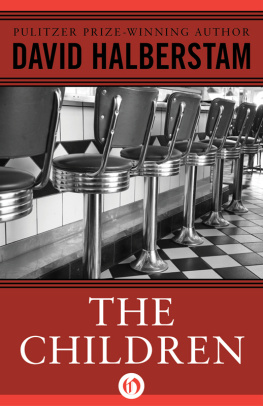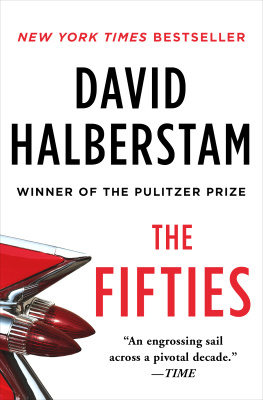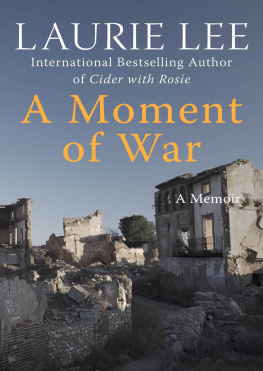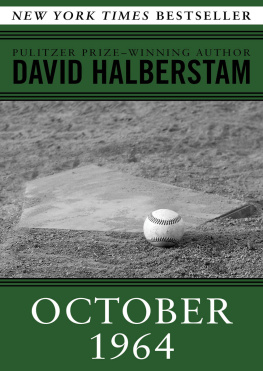
The Children
David Halberstam

This book is dedicated to the memory of three uncommon men who played influential roles in my life when I lived and worked in Nashville:
COLEMAN HARWELL 1905-1987
JENNINGS PERRY 1900-1987
KELLY MILLER SMITH 1920-1984
BOOK 1
THE CHILDREN
Prologue
YEARS LATER THOUGH SHE could recall almost every physical detail of what it had been like to sit there in that course on English literature, Diane Nash could remember nothing of what Professor Robert Hayden had said. What she remembered instead was her fear. A large clock on the wall had clicked slowly and loudly; each minute which was subtracted put her nearer to harms way. What she remembered about the class in the end was her inability to concentrate, and the fact that both her hands were soaked with sweat by the end of the class and left the clear handprint of her fear on the wooden desk. It was always the last class that she attended on the days that she and her colleagues assembled before they went downtown and challenged the age-old segregation laws at the lunch counters in Nashvilles downtown shopping center. No matter how much she steeled herself, no matter how much she believed in what they were doing, the anticipatory fear never left her.
It had been at its height the night before the first sit-in, on February 13, 1960. On that evening, she had sat alone in her room at Fisk University. Suddenly she was hit with an overpowering attack of nerves. What had she gotten herself into? she wondered. She was supposed to march that next day into downtown Nashville and challenge the existing white power structure. She, Diane Nash, a coward of the first order in her own mind, a person absolutely afraid not just of violence but of going to jail, was going to join a small group of black children and ministers and take on the most important and resourceful people in a big, very white, very Southern city. She and her friends, who had nothing and were nothing, were going to go up against white businessmen, who were rich and powerful and connected to the white politicians, who were their pals and who agreed with them on everything. What had all of them been thinking in Jim Lawsons workshops on nonviolence? These men would have nothing but scorn for a bunch of black children venturing into their territory.
These were white men in their forties and fifties and sixties. They owned the police force of the city and they owned the judges who sat in the citys courts. And she, Diane Nash of Chicago, could not make a phone call to a single powerful person in all of America if her life depended on it, which indeed it might. She was now all of twenty-one and she was in way over her head. Somehow she had been caught in the camaraderie, and had begun to surface as someone outspoken and confident. The others, she knew, had already started to look up to her as a leader, but they had no idea how scared she was. It was a joke, she thought, it will never happen. We are a bunch of children. Were nice children, bright and idealistic, but we are children and we are weak. We have no police force, no judges, no cops, no money. Jim Lawson is a fine man and a good leader, she thought, but this is nothing but a dream. She could almost see those powerful white men, like the white men she had seen in movies, who sat around and knew how to make decisions, hearing the news that a small group of black students were insisting on being served at the lunch counters at downtown stores, and laughing at them. She felt pure terror in her heart at that moment, and if there had been any way she could disappear from the movement without causing great shame to herself and letting down these others, she would have done it. If there was anything besides the cause itself which kept her from bailing out, it was the growing loyalty she now felt to the others in this small and, she hoped, hardy group of young students who had become not merely her colleagues, but now, her friends. They had started out quite tentative with one another; they came from different parts of the country, went to different schools, and there were obviously significant differences in class among some of them. What they shared, however, was a powerful common purpose, one which was becoming a more dominant part of their lives every day: The more committed they were, the more their past differences seemed less important, and their new political kinship became the critical part of their daily lives. It was as if the longer they stayed in, the more they left their old world with their old friendships behind, and the more this new political incarnation became the single dominating part of lives which had suddenly been completely redrawn. Besides, she liked them: Rodney Powell was a medical student, serious and cerebral and well spoken. John Lewis was rural and shy, but he was already known by the others for the steadfast quality of his characterthere wasnt anything he would not do for the cause. Curtis Murphy was full of laughter and charm. Gloria Johnson was obviously bright, but shy and a little stiff. Jim Bevel was provocative, a little older than the others, difficult, brilliant, but unpredictable, a young man whom the others both admired but found prickly. The more she knew them, the more she was impressed by them. Now, above all, she did not want them to think badly about her.
Besides, she shared their passion for the cause. She knew exactly why, despite her fear, she had joined up with them. Soon after arriving at Fisk the previous fall she had been taken to the Tennessee State Fair by one of the many young men vying for her attention. Since there did not seem a lot to do in Nashville socially, at least not compared with Chicago, or Washington, where for a time she had been a student, she gladly went along. There for the first time in her life she encountered signs for segregated rest rooms. WHITE ONLY, the sign had said, the first of those most odious signs she had ever beheld. And then COLORED. The humiliation she had felt was immediateit was as if someone had slapped her face. What shocked her even more was that her date, who was from the South, did not seem surprised or offended; he quite willingly seemed to accept it. But for her the experience was so transcending, her anger so immediate and so complete that she was effectively politicized from that moment on. It was her first encounter with overt legal discriminationshe had known covert discrimination in Chicago, but she had always managed to look away. Worse, that terrible day at the fair had been followed up very quickly by other comparable humiliations. As a girl growing up in Chicago she had been accustomed to going downtown and shopping with her friends. There had been a certain aimlessness to those shopping trips. They would wander through the great department stores of the city, enjoying the role of shopper and viewer, and then they would have lunch at a restaurant in one of the stores. But when she tried to do this in Nashville she found that the store owners welcomed her money on most floors of the store but that she and her friends were not welcome in their lunchrooms. That had angered her every bit as much as the moment of humiliation at the state fair. After that she had begun to take notice of what was around her in downtown Nashville: In the center of the downtown there were black people eating their lunches while sitting on the sidewalk. That was yet another shock to her. She had come to the South almost casually, choosing Fisk because she was restless with her life at home. She had not thought very hard about the racial consequences of what she was doinga black woman raised in the North moving to a region where the laws of segregation were just coming under legal and social challenge.
Next page


















